Change Research/ CNBC Poll: June 12-14, 2020
Key Takeaways
- Biden is increasing his lead over Trump, and now leads by 10 points nationally and by 3 points in the battleground, including leading in each of the six battleground states.
- Majorities disapprove of Trump job overall and on every key issue, with disapproval of handling of COVID-19 hitting a new high of 55% in the battleground.
- The number saying their state is reopening too quickly has ticked up, and majorities say it is unsafe to go to a protest or a political campaign rally.
- 53% of battleground voters disagree that Trump has done enough to help working Americans make it through the current economic downturn.
- Only 23% of battleground voters say Trump’s response to the killing of George Floyd and protests for criminal justice reform has been mostly helpful and racism is a top issue.
Biden widens lead nationally and in the battleground states
Joe Biden’s lead over Trump has grown over the past two weeks in both the national and the battleground surveys. He leads by 10 points nationally (51% Biden, 41% Trump), a 3-point gain since we last fielded, and he leads by 3 points in the battleground (48% Biden, 45% Trump), a 2-point gain since we last fielded. Biden is also leading in all six states in the battleground.
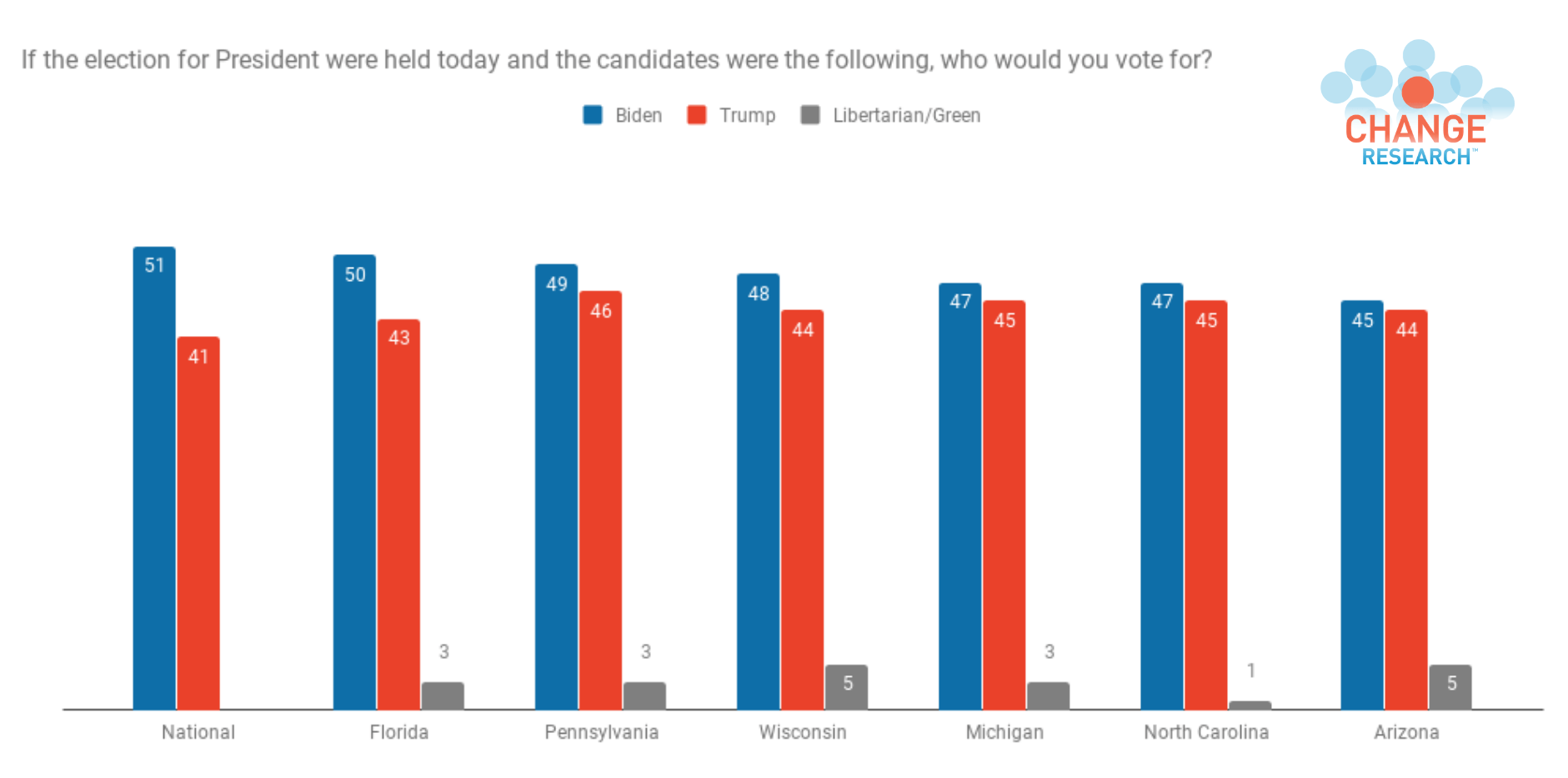
Majorities in the battleground disapprove of Trump’s overall job performance (53% disapprove, 50% strongly disapprove). Notably, disapproval of Trump’s handling of the coronavirus outbreak is at a new 55% high in our polling (up from 52% disapprove two weeks ago). Majorities also give him negative marks for his handling of every other key issue tested in this survey.
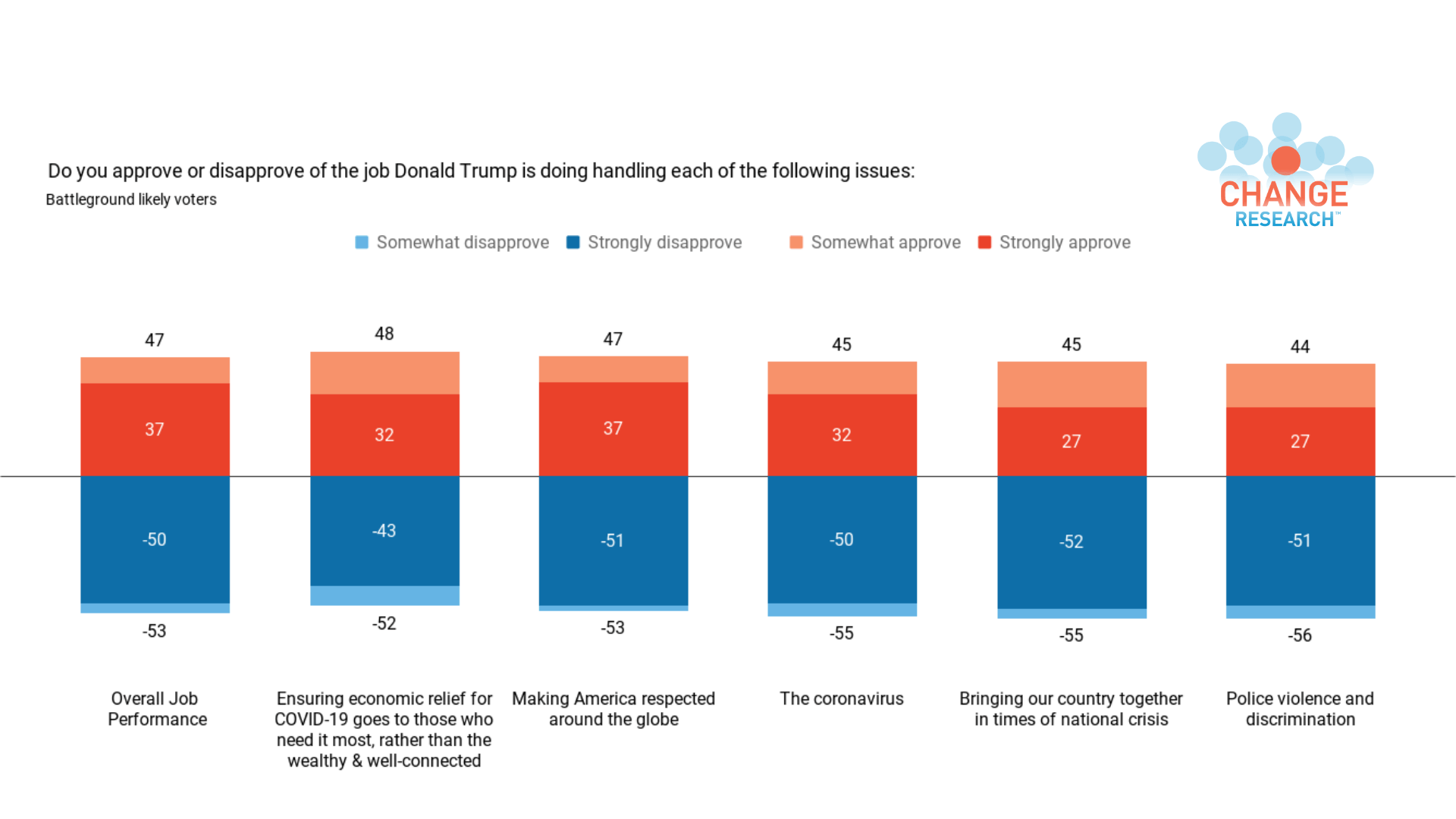
Negative ratings of Trump are 3 to 4 points worse nationally on these topics.
Battleground voters don’t just disapprove of the job Trump is doing, they increasingly prefer Biden and Democrats to Trump and Republicans when it comes to handling key issues. Critically, Biden and Trump are even when it comes to handling ‘the economy’ and ‘helping your pocketbook’ for the first time in our battleground polling. Voters only believe Trump would do a better job on one issue — getting people back to work (52%) — which he has been pushing people to do despite COVID-19 risks.

Voters are concerned about reopening too quickly
Voters remain seriously concerned about the coronavirus (70% serious concerns nationally, 64% in the battleground). Voters also remain more worried about the impact of COVID-19 on their family’s health and safety (69% nationally, 66% in the battleground) than the impact on their family’s finances (31% nationally, 34% in the battleground). A 54% majority of voters in the battleground agree with the statement “Donald Trump is pushing states to reopen their economies too quickly in order to boost his own re-election chances.”
As COVID-19 hospitalizations tick up in many states two weeks after Memorial Day re-openings, we see an increase in the number of people saying that their state is opening too quickly, particularly in Arizona and Florida.
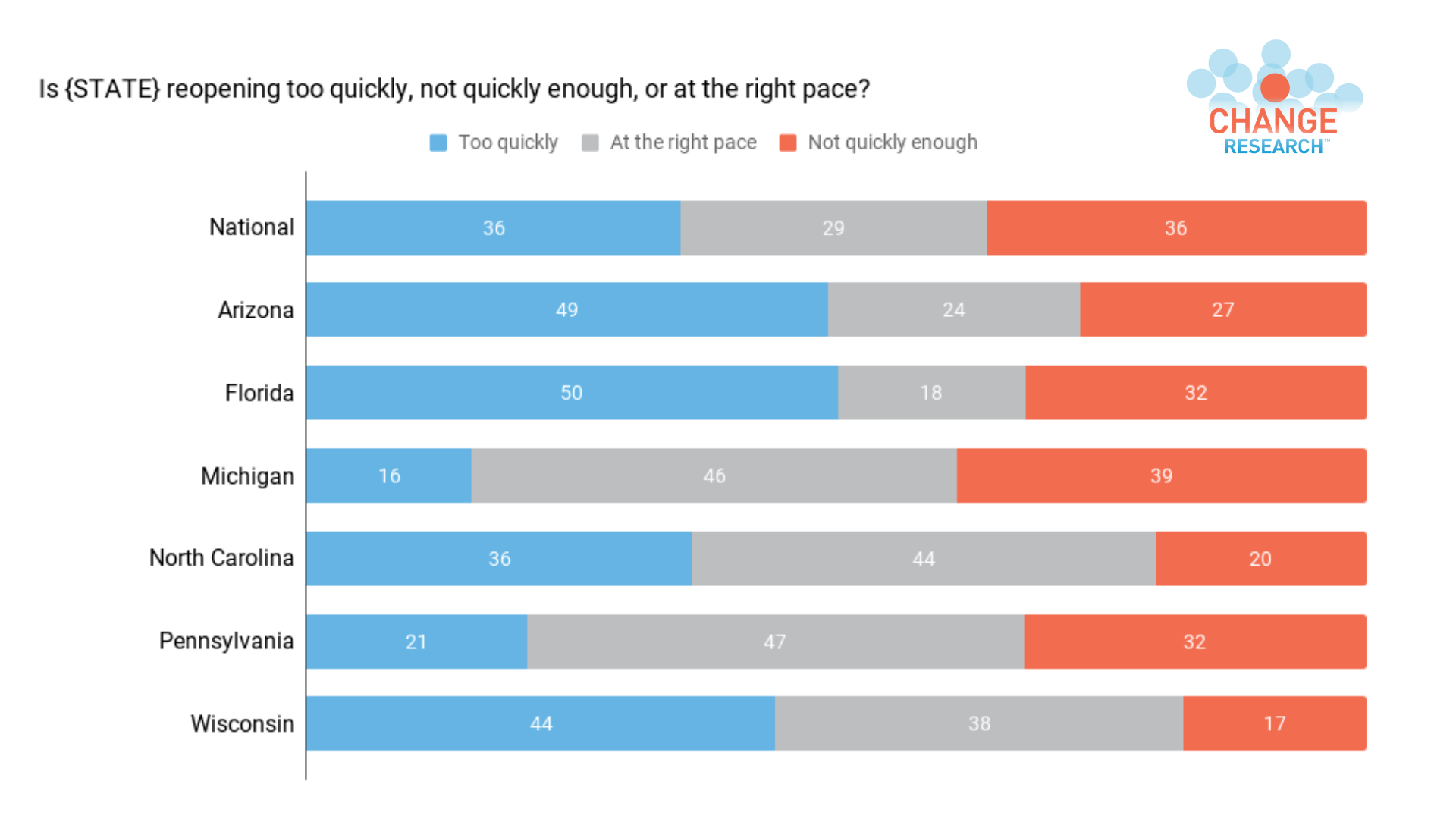
Similarly there was not a significant change in the number who say that certain activities are safe over the past two weeks, with only a handful of activities considered safe by a majority of voters. With President Trump planning to hold a campaign rally on June 20th, only 32% say that this is safe to do so. The most unsafe activity tested was attending a protest, with just 23% saying that was safe. The difference is largely driven by the responses of Republicans:
- Attend a protest – 39% safe, 48% unsafe
- Attend a campaign rally – 69% safe, 12% unsafe
For context, just 55% of Republicans felt it was safe to attend a large indoor sporting event, while 73% felt it was safe to attend such an event outdoors.
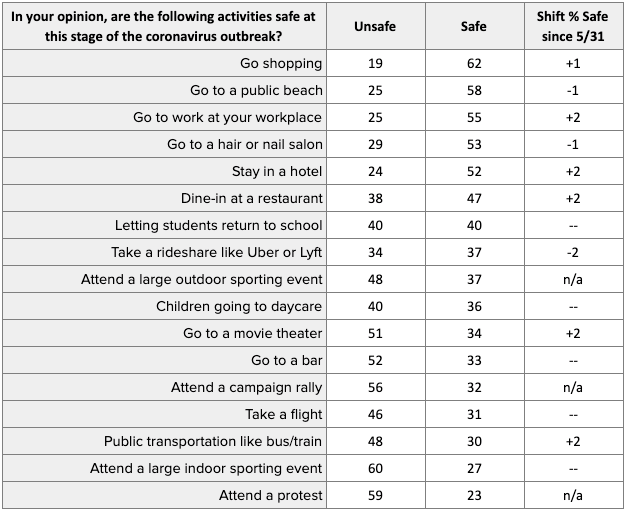
Voters say Trump is not doing enough to respond to economic impact of COVID
As the stock market continues to rise and the unemployment rate falls, voters grow more positive on economic metrics — but still large majorities of battleground voters say that things are in bad shape. A 61% majority still rate both the national economy and national job market in poor/not so good condition. At a personal level, 41% of voters nationally and 37% in the battleground say they or someone in their household has lost a job or been furloughed. Further — 51% of voters nationally and in the battleground — say they or someone in their household has had their wages or salary cut.
A 53% majority of voters disagree with the statement “Donald Trump has done enough to help working Americans make it through the current economic downturn” and strong disagreement outpaces strong agreement 44% to 29%. Those who disagree include 58% of those who are undecided in the ballot, 58% who live in a household that had a pay cut due to COVID-19, and 61% who live in a household that experienced a job loss or furlough due to COVID-19.
Racism is a top issue; voters support protesters and say Trump’s response was harmful
Racism and discrimination is the third most important issue to voters in the battleground and nationally — just behind health care and drug costs, and the economy, jobs and cost of living and ahead of COVID-19. Racism and discrimination is the number one issue among college women (52%), 18-34 year olds (53%), and African Americans (82%), but it is also a top 3 issue for every major age and race cohort in the battleground, and even a top three issue for white women.
A 71% majority in the battleground have favorable opinions of the people peacefully protesting the killing of George Floyd, including majorities of white college women (79% favorable), white college men (73%), white non-college women (66%), and white non-college men — the core of Trump’s base (57%). Though Republicans do not prioritize racism and discrimination as an issue, even Republicans are 10-points net favorable towards the protesters of the killing of George Floyd.
A 52% majority of voters in the battleground and 56% nationally say ‘Donald Trump’s response to the killing of George Floyd and protests for criminal justice reform’ were mostly harmful. Just 23% of voters in the battleground and 21% nationally say Trump’s response was helpful. As we have already seen, Trump receives his worst marks, generally and in a contest with Biden, on the issue of ‘police violence and discrimination.’
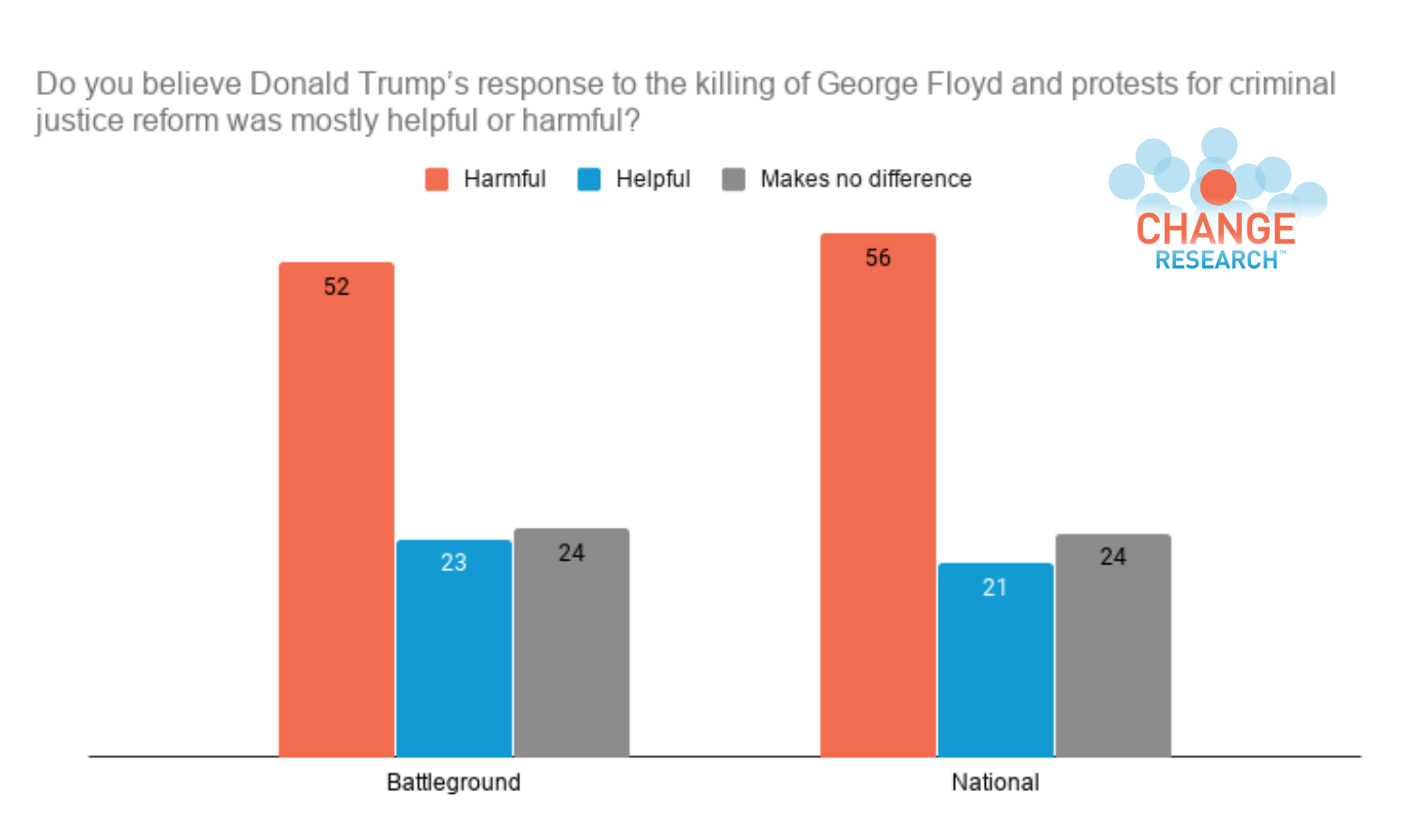
As the debate turns to reforming and re-imagining policing in America, voters appear open to the spirit of the defund and reform movement. A stunning 64% of voters nationally and 61% of voters in the competitive battleground agree that “We should invest more in education, mental health, and social services and spend less on policing.”
Protesters want more than just an end to racist policing, they are also demanding an end to the racism and discrimination that produces the disproportionate impact in healthcare and economic outcomes for black and brown people that have been so evident during the COVID-19 pandemic. While majorities say that people of color have the same economic opportunities as white people at their own workplace (59% in the battleground), and pluralities say that is true in their communities (49%), a 53% majority says that is not true in the nation as a whole. There were significant differences in opinion by race on this question. Large majorities of black voters saying they do not have the same opportunities in their workplace, their communities, or the country as a whole, while Latinx voters responded more like white voters, with majorities saying people of color had the same opportunities in their workplaces and communities.
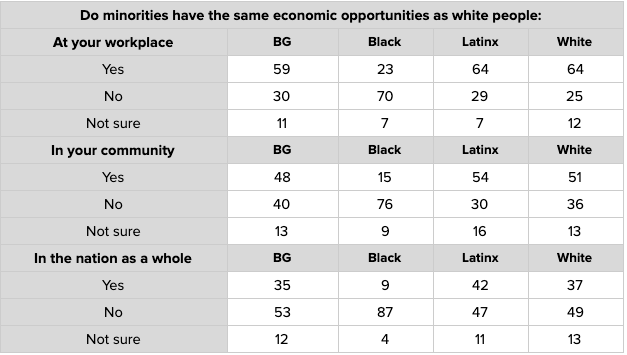
Furthermore, roughly half of voters say that businesses are not doing enough to promote diversity and inclusion (49%). Only one group of battleground voters is more likely to say that businesses are doing ‘the right amount’ than ‘not enough’ — white working class men (52% right amount, 29% not enough, 19% too much).
Battleground Sample & Methodology
National Companion Survey Toplines
National Companion Survey Sample & Methodology
For media inquiries, please email [email protected]
Change Research conducted a poll of 2,408 likely voters June 12-14, 2020 across 6 competitive battleground states: Arizona, Florida, Michigan, North Carolina, Pennsylvania, and Wisconsin. A companion national survey of 1,250 likely voters was also conducted June 12-14, 2020. Unless otherwise stated, the results presented in this analysis are among battleground state voters. The margin of error, as traditionally calculated, is ±2.00% for the battleground and ±2.77% for the national poll. Change Research reaches voters via targeted online ads that point people to an online survey instrument. Our Dynamic Online Sampling establishes and continuously rebalances advertising targets across region, age, gender, race, and partisanship to dynamically deliver large samples that accurately reflect the demographics of a population. Post stratification was done on state, gender, age, race, education, and 2016 presidential vote.
This is the seventh in a series of bi-monthly battleground state and national surveys that CNBC & Change Research will conduct in 2020.
